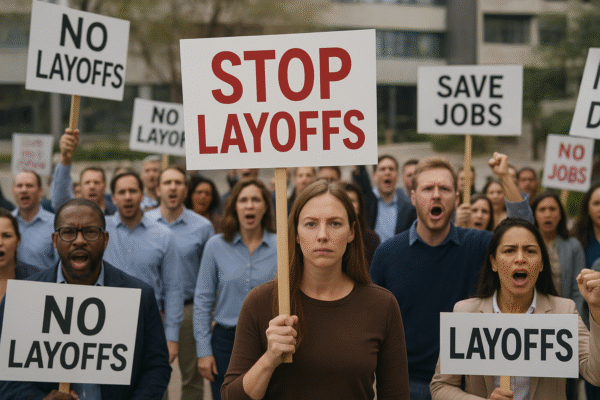Job burnout, as quiet as it can be — a few years ago, I found myself waking up more exhausted than when I went to bed. My inbox was always full, but my motivation felt permanently out of stock. Even small tasks felt like moving mountains. I chalked it up to needing more coffee or a good weekend.
But weekends came and went. And so did the coffee. What stayed was a growing sense of emotional fatigue. I wasn’t just tired — I was burned out.
If you’ve ever felt this way — like your job is draining the life out of you — you’re not alone. In fact, job burnout is now considered a full-blown workplace epidemic.
Let’s dig into what it really is, how to spot it, and what you can actually do about it.
What is Job Burnout, Really?
Job Burnout isn’t just stress. It’s what happens when chronic stress meets a lack of recovery and meaning. According to the World Health Organization, job burnout is a syndrome resulting from chronic workplace stress that has not been successfully managed.
It shows up as:
- Emotional exhaustion
- Cynicism or detachment from the job
- A reduced sense of accomplishment
Burnout doesn’t happen overnight. It creeps in — and if you’re not paying attention, it takes over.
46% ! — Why You Should Be Worried
Here’s a number that should raise eyebrows:
🔹 46% of global employees have reported experiencing job burnout at some point in their career (Microsoft Work Trend Index).
That’s nearly 1 in 2 people you work with — maybe including you. And among remote workers or those in high-demand roles, the rate is even higher.
The 46% isn’t just a stat — it’s a red flag that modern work culture often glamorizes hustle while ignoring human limits.
The Sneaky Signs of Burnout
Burnout doesn’t always scream. Sometimes, it whispers.
Here are some early and late-stage signs to watch for:
✅ Emotional exhaustion: You feel drained even after a full night’s sleep
✅ Reduced performance: You can’t concentrate, and tasks take longer
✅ Cynicism and detachment: You feel numb, irritable, or negative about your job
✅ Physical symptoms: Headaches, stomach issues, and even chest pain
✅ Sleep problems: Either insomnia or oversleeping
These aren’t just signs of “needing a break” — they’re symptoms your mind and body are giving you as warnings.
The 4 Stages of Job Burnout
Job burnout unfolds gradually, like this:
- Honeymoon Phase: You’re enthusiastic, but may be overcommitting
- Onset of Stress: You start skipping breaks, work late, and feel pressure
- Chronic Stress: You’re tired, irritable, and productivity dips
- Burnout: You feel empty, disconnected, and maybe even dread Mondays
Understanding these stages can help you catch it before it goes too far.
The 3 R’s of Job Burnout Recovery
Dr. Herbert Freudenberger, who coined the term “burnout,” suggested the 3 R’s approach:
- 🛑 Recognize: Be honest about your symptoms
- 🔁 Reverse: Undo damage by seeking support and changing routines
- 🔄 Resilience: Build stress resistance through healthy habits
Burnout recovery isn’t instant — but it’s possible. It isn’t a vacation — it’s a system of healing:
✴️ Set Boundaries
Start saying no. Respect your off-hours like you respect deadlines.
✴️ Prioritize Sleep
Sleep isn’t a luxury; it’s burnout’s biggest enemy.
✴️ Move Your Body
Exercise can rewire your brain chemistry. Even 20-minute walks help.
✴️ Get Support
Whether it’s a mentor, therapist, or friend — talk it out.
✴️ Reflect on Purpose
Sometimes burnout comes from misalignment. Are you doing work that matters to you?
How to Beat Job Burnout — Without Quitting Your Job
Good news: You don’t have to quit to recover. Try these:
- 🕐 Micro-breaks: Take 5 minutes every hour to breathe or stretch
- 📅 Rebalance workload: Talk to your manager about priorities
- 🎯 Job crafting: Redesign your tasks to focus more on what energizes you
- 🌿 Create recovery rituals: Start your day with meditation or end with a walk
- 🎧 Digital detox: Log off fully after work hours
Sometimes it’s not the job, but how the job is taking over your life.
Thinking of quietly quitting 9-5 rat race? Here is your place.
Final Thought: Job Burnout Is Not a Personal Failure
If you’re burned out, it’s not because you’re weak or incapable.
It means you’ve been strong for too long without support.
Take burnout as a cue — not to quit everything, but to start listening to what your mind and body are telling you.
Because no deadline is worth your health.
And no job title is worth losing yourself.
Related Reads:





Leave a Reply